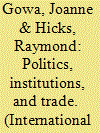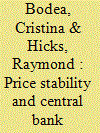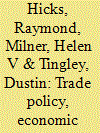|
|
|
Sort Order |
|
|
|
Items / Page
|
|
|
|
|
|
|
| Srl | Item |
| 1 |
ID:
123014


|
|
|
|
|
| Publication |
2013.
|
| Summary/Abstract |
Recent studies cast doubt on the value added of international trade agreements and institutions. Using a new data set that consists of about 35,000 observations on the trade of fifty-four nations between 1919 and 1938, we examine whether this skepticism also applies to the infamous interwar trade blocs. Traditional historical accounts attribute to them a large drop in international trade and a rise in the political tensions that would later erupt in World War II. In this study, we show that no bloc raised trade among its members as a whole or decreased trade between members and nonmembers. However, our findings are not wholly consistent with the skepticism recent studies express. We argue that conflicts of interest among the great powers encouraged the emergence of the bloc system and also gave rise to intrabloc trade shifts consistent with the political interests of their great-power hubs. The political-military alliances these conflicts created also reduced trade between their signatories, and we argue more generally that the causal chain runs from politics to trade. As a result, measuring only the effect of agreements and institutions on aggregate trade between their members can generate inaccurate estimates of their value added.
|
|
|
|
|
|
|
|
|
|
|
|
|
|
|
|
| 2 |
ID:
139788


|
|
|
|
|
| Summary/Abstract |
Despite mixed empirical evidence, in the past two decades central bank independence (CBI) has been on the rise under the assumption that it ensures price stability. Using an encompassing theoretical approach and new yearly data for de jure CBI (seventy-eight countries, 1973–2008), we reexamine this relationship, distinguishing the role of printing less money (discipline) from the public's beliefs about the central bank's likely actions (credibility). Democracies differ from dictatorships in the likelihood of political interference and changes to the law because of the presence of political opposition and the freedom to expose government actions. CBI in democracies should be directly reflected in lower money supply growth. Besides being more disciplinarian, it also ensures a more robust money demand by reducing inflation expectations and, therefore, inflation. Empirical results are robust and support a discipline effect conditioned by political institutions, as well as a credibility effect.
|
|
|
|
|
|
|
|
|
|
|
|
|
|
|
|
| 3 |
ID:
111168


|
|
|
|
|
| Publication |
2012.
|
| Summary/Abstract |
Reciprocal trade agreements (RTAs) have proliferated rapidly in Asia in recent years, an unprecedented phenomenon in a region in which state-led institution-building efforts were largely unsuccessful during the Cold War years. In this article, we investigate the qualitative provisions of RTAs in Asia, focusing on agreements that are professedly geared toward trade liberalization through reciprocal exchanges of trade concessions. We build on the concept of credible commitment- that states "tie their hands" through international agreements and thus signal strong commitment to trade liberalization. We argue that a broad range of agreement provisions will affect an RTA's ability to achieve its primary objective: trade liberalization. We present a coding scheme that measures the strength of a wide variety of provisions in the legal texts of RTAs. Using quantitative analysis, we analyze the impact of various components of Asia's RTAs on participants' trade flows.
|
|
|
|
|
|
|
|
|
|
|
|
|
|
|
|
| 4 |
ID:
131002


|
|
|
|
|
| Publication |
2014.
|
| Summary/Abstract |
Developing countries have increasingly opened their economies to trade. Research about trade policy in developed countries focuses on a bottom-up process by identifying economic preferences of domestic groups. We know less about developing countries. We analyze how economic and political variables influenced Costa Rican voters in a referendum on CAFTA-DR, an international trade agreement. We find little support for Stolper-Samuelson models of economic preferences, but more support for specific factor models. We also isolate the effects of political parties on the referendum, controlling for many economic factors; we document how at least one party influenced voters and this made the difference for CAFTA-DR passage. Politics, namely parties using their organizational strength to cue and frame messages for voters, influenced this important trade policy decision. Theories about trade policy need to take into account top-down political factors along with economic interests.
|
|
|
|
|
|
|
|
|
|
|
|
|
|
|
|
|
|
|
|
|